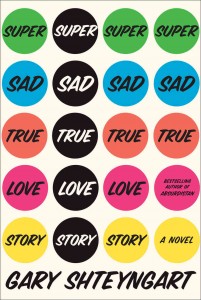Shteyngart, Gary (2010). Super Sad True Love Story. New York: Random House.
This is my second attempt to read Shteyngart, a darling of the literary fiction world these days. Earlier, I had attempted to read Absurdistan and was baffled. I couldn’t penetrate more than 50 pages, it was so awful (and not-funny). When I saw Super Sad on a remainders table, I saw an opportunity to give this highly-regarded author another chance. This time I pushed through to the very end, thinking that the author’s redemption was just a page turn away. It wasn’t.
The core of the story is a romance between a 39 year-old biotech salesman, Lenny, and a 20 year-old Korean immigrant, Eunice. “Romance” is too strong a word for their relationship. Lenny is head-over-heels in love, just because he’s an extremely lonely, ageing nerd. Eunice needs a “provider,” someone with a good credit score and an apartment in Manhattan. She treats him like dirt, which he feels he deserves, and that deepens his neurotic love. Eventually they break up. So much for that.
Another key aspect of the story is its setting in a near-future American dystopia. The government’s obsession with “security” has put national guard troops on every corner, hard currency is the yuan, and the country is at war with Venezuela. Everybody is glued to their apparatik, some kind of super smartphone used not only for communications, but for scanning other people, to learn their credit score, metabolic health, and “fuckability rating.” Everyone talks in slogans and shibboleths. People can scan documents for searchable data, but nobody can actually read. It’s a “post-literate society.” Eventually the guard attacks “low net-worth individuals” occupying Central Park in tents.
A final theme is supposed to be about mortality. Lenny works for a “life-extension” company that promises eternal youth soon, but youthful appearance now. That theme satirizes American’s worship of youth culture, fear of ageing, and fear of death. Unfortunately, the satire is lame, though, being little more than statements that death is “bad.” There’s no real examination of or reflection on the meaning of mortality, so the theme does not contribute much to the book and remains a flat joke.
The narration is epistolary, with chapters alternating between Lenny’s diary and Eunice’s online messaging with her sister and parents (her mother’s persona is shamelessly stolen from comedian Margaret Cho’s stand-up routine). Lenny’s entries start in second-person (“dear diary”), but quickly morph into long, detailed first-person accounts. Eunice’s chapters ostensibly have no narrator, being merely the text of online chats, but they also evolve into long first-person descriptions.
The first 75 pages are interesting, fresh, and funny, playing off exaggerated stereotypes and satirical premises. But you can’t publish a 75-page book, so Shteyngart cycles the same jokes over, and over again, mind-numbingly, right to the pointless ending. If you found a copy for a couple of dollars, that’s a fair price to pay for an enjoyable 75-page literary flourish. Beyond that, there’s nothing.

